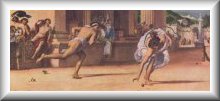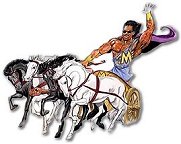
MYTH MAN'S ATALANTA - PAGE ONE
ALL ABOUT THE FAMOUS RACE
BETWEEN ATALANTA & HIPPOMENES
by Padraic Colum (1881–1972) from his 1921 book
The Golden Fleece and the Heroes Who Lived before Achilles
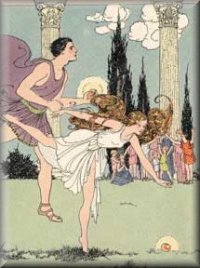
| (she was) noted for her speed of foot and her delight in the race - the daughter of Schœneus, King of Bœotia, Atalanta of the Swift Foot. |
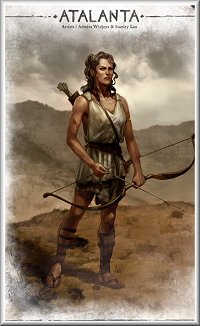 CLICK TO ENLARGE |
| Once there came a youth from a far part of Greece into the country that Atalanta’s father ruled over. Hippomenes was his name. |
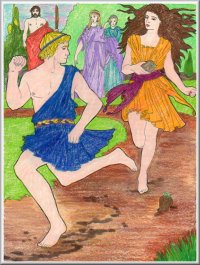 CLICK TO ENLARGE |
| “She is a witch,” he said to himself, “she must be a witch to draw so many youths to their deaths, and she, no doubt, will show in her face and figure the witch's spirit." |
 CLICK TO ENLARGE |
| She turned her face to him, and then she knew by the wildness that was in his look that he had come to enter the race with her. |
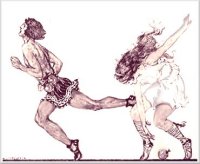 CLICK TO ENLARGE 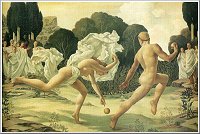 CLICK TO ENLARGE 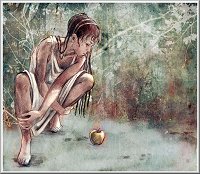 CLICK TO ENLARGE |
There are two Atalantas, she said; she herself, the
Huntress, and another who is noted for her speed of foot and her delight in the
race—the daughter of Schœneus, King of Bœotia, Atalanta of the Swift Foot.
So proud was she of her swiftness that she made a vow to the gods that none
would be her husband except the youth who won past her in the race.
Youth after
youth came and raced against her, but Atalanta, who grew fleeter and fleeter of
foot, left each one of them far behind her.
The youths who came to the race were so many and the clamor they made after
defeat was so great, that her father made a law that, as he thought, would
lessen their number.
The law that he made was that the youth who came to race against Atalanta and
who lost the race should lose his life into the bargain.
After that the youths who had care for their lives stayed away from Bœotia.
Once there came a youth from a far part of Greece into the country that
Atalanta’s father ruled over. Hippomenes was his name. He did not know of the
race, but having come into the city and seeing the crowd of people, he went with
them to the course.
He looked upon the youths who were girded for the race, and he heard the folk
say amongst themselves, “Poor youths, as mighty and as high-spirited as they
look, by sunset the life will be out of each of them, for Atalanta will run past
them as she ran past the others.”
Then Hippomenes spoke to the folk in wonder, and they told him of Atalanta’s
race and of what would befall the youths who were defeated in it.
“Unlucky youths,” cried Hippomenes, “how foolish they are to try to win a bride
at the price of their lives.”
Then, with pity in his heart, he watched the youths prepare for the race.
Atalanta had not yet taken her place, and he was fearful of looking upon her.
“She is a witch,” he said to himself, “she must be a witch to draw so many
youths to their deaths, and she, no doubt, will show in her face and figure the
witch’s spirit.”
But even as he said this, Hippomenes saw Atalanta. She stood with the youths
before they crouched for the first dart in the race. He saw that she was a girl
of a light and a lovely form.
Then they crouched for the race; then the trumpets rang out, and the youths and
the maiden darted like swallows over the sand of the course.
On came Atalanta, far, far ahead of the youths who had started with her. Over
her bare shoulders her hair streamed, blown backward by the wind that met her
flight. Her fair neck shone, and her little feet were like flying doves.
It seemed to Hippomenes as he watched her that there was fire in her lovely
body. On and on she went as swift as the arrow that the Scythian shoots from his
bow.
And as he watched the race he was not sorry that the youths were being left
behind.
Rather would he have been enraged if one came near overtaking her, for now his
heart was set upon winning her for his bride, and he cursed himself for not
having entered the race.
She passed the last goal mark and she was given the victor’s wreath of flowers.
Hippomenes stood and watched her and he did not see the youths who had started
with her—they had thrown themselves on the ground in their despair.
Then wild, as though he were one of the doomed youths, Hippomenes made his way
through the throng and came before the black-bearded King of Bœotia.
The king’s brows were knit, for even then he was pronouncing doom upon the
youths who had been left behind in the race. He looked upon Hippomenes, another
youth who would make the trial, and the frown became heavier upon his face.
But Hippomenes saw only Atalanta. She came beside her father; the wreath was
upon her head of gold, and her eyes were wide and tender.
She turned her face to him, and then she knew by the wildness that was in his
look that he had come to enter the race with her.
Then the flush that was on her face died away, and she shook her head as if she
were imploring him to go from that place.
The dark-bearded king bent his brows upon him and said, “Speak, O youth, speak
and tell us what brings you here.”
Then cried Hippomenes as if his whole life were bursting out with his words:
“Why does this maiden, your daughter, seek an easy renown by conquering weakly
youths in the race? She has not striven yet. Here stand I, one of the blood of
Poseidon, the god of the sea. Should I be defeated by her in the race, then,
indeed, might Atalanta have something to boast of.”
Atalanta stepped forward and said: “Do not speak of it, youth. Indeed I think
that it is some god, envious of your beauty and your strength, who sent you here
to strive with me and to meet your doom. Ah, think of the youths who have
striven with me even now! Think of the hard doom that is about to fall upon
them! You venture your life in the race, but indeed I am not worthy of the
price. Go hence, O stranger youth, go hence and live happily, for indeed I think
that there is some maiden who loves you well.”
“Nay, maiden,” said Hippomenes, “I will enter the race and I will venture my
life on the chance of winning you for my bride. What good will my life and my
spirit be to me if they cannot win this race for me?”
She drew away from him then and looked upon him no more, but bent down to fasten
the sandals upon her feet. And the black-bearded king looked upon Hippomenes and
said, “Face, then, this race to-morrow. You will be the only one who will enter
it. But bethink thee of the doom that awaits thee at the end of it.”
The king said no more, and Hippomenes went from him and from Atalanta, and he
came again to the place where the race had been run.
He looked across the sandy course with its goal marks, and in his mind he saw
again Atalanta’s swift race.
He would not meet doom at the hands of the king’s soldiers, he knew, for his
spirit would leave him with the greatness of the effort he would make to reach
the goal before her.
And he thought it would be well to die in that effort and on that sandy place
that was so far from his own land.
(Continued on Page Two)
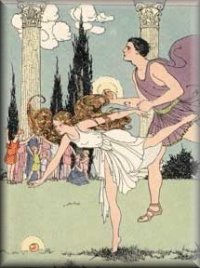
| So proud was she of her swiftness that she made a vow to the gods that none would be her husband except the youth who won past her in the race. |
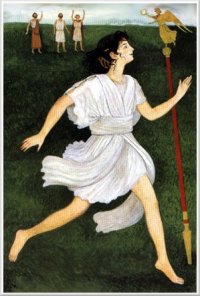 CLICK TO ENLARGE |
| Over her bare shoulders her hair streamed, blown backward by the wind that met her flight. Her fair neck shone, and her little feet were like flying doves. |
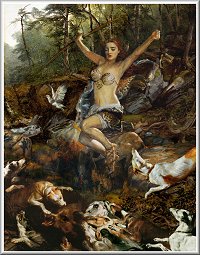 CLICK TO ENLARGE |
|
It seemed to Hippomenes as he watched her that there was fire in her lovely body. On and on she went as swift as the arrow that the Scythian shoots from his bow. |
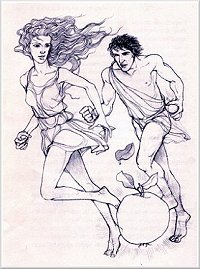 CLICK TO ENLARGE |
| “I will enter the race and I will venture my life on the chance of winning you for my bride. What good will my life and my spirit be to me if they cannot win this race for me?” |
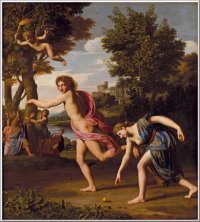 CLICK TO ENLARGE  CLICK TO ENLARGE 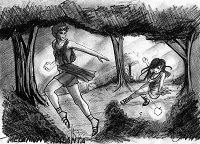 CLICK TO ENLARGE |
[HOME] [MYTHOLOGY'S EFFECTS ON MODERN SOCIETY] [OLYMPIANS]
Web, myth narration and graphics created and maintained by Nick Pontikis
Copyright © 1995 Nick Pontikis
Thanasi's Olympus Greek
Restaurant
Copyright 1999 mythman.com
greekmythologytoday.com
mythmaniacs.com
The Myth Man persona copyright 1988 Nick Pontikis
